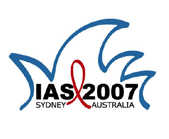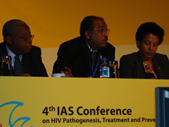The 4th IAS Conference on HIV Pathogenesis, Treatment and Prevention came to a close in Sydney, Australia today. More than 5,000 delegates from 133 countries came together for the four-day conference to examine the latest developments in HIV-related research.
“The science presented here in Sydney is not only about new advances in treatment and prevention -- as important as those are -- but also about how to support developing countries in strengthening health delivery systems to make those advances a reality for people in need and at risk," said IAS President Dr. Pedro Cahn, International Conference Co-Chair and Director of Fundación Huesped in Argentina.
HIV clinicians and community leaders heard reports from some of the world’s leading researchers involved in basic, clinical and prevention science. Presentations included the roll out of antiretroviral treatment in the developing world and the need for research to inform treatment scale-up, HIV/TB co-infection, and ethical and practical issues related to HIV prevention research.
Emphasising the need to scale-up TB/HIV programmes Michel Sidibe, UNAIDS Deputy Executive Director of Programmes, UNAIDS said, "Urgent investment in TB research and programmes is needed if we are to avoid TB, and especially drug resistant TB, undoing all the advances we have gained through better AIDS treatment and care. All of our drugs, diagnostics and vaccines date from the last century or even the century before that."
 Opening ceremony.
Opening ceremony.
Photo credit: IASThe scientists, clinicians, public health experts and community leaders also heard about research on novel prevention and treatment strategies, the cutting-edge use of gene therapy to treat HIV disease, female-initiated prevention technologies, provider-initiated HIV testing and the prevention of mother-to-child transmission.
“With fewer than one-third of people living with HIV in low- and middle-income countries having access to life-saving medications, and still fewer with access to proven prevention services, such as condoms and sterile syringes, the goal of universal access by 2010 must remain a priority,” said IAS President Dr. Pedro Cahn, International Conference Co-Chair and Director of Fundación Huesped in Argentina. “Science has given us the tools to prevent and treat HIV effectively. The fact that we have not yet translated this science into practice is a shameful failure.”
The conference was opened with a declaration from the organizers urging that 10% of all resources dedicated to HIV programming be used for research. By the close, more than 1,550 scientists, clinicians, policy makers and community leaders from around the world had signed the Sydney Declaration.
The International AIDS Society announced the selection of Cape Town, South Africa, as host of the 5th IAS Conference on HIV Pathogenesis, Treatment and Prevention in July 2009. The event will be organized by the IAS, in partnership with South African-based non-governmental organisation Dira Sengwe, the organizer of the South African AIDS Conferences.
Links:
Visit the web site of the International AIDS Society






